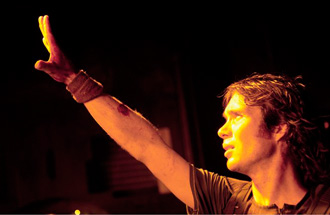Before Their Time: Sunshine
By Daniel MacDonald
July 16, 2009
The best science fiction pictures tend to be among the most unappreciated on their initial release, and that's not particularly surprising. Heavy duty, no-fooling-around sci-fi is about ideas, replacing action scenes with conversation and making elusive concepts real, then taking them to their natural conclusion. It can be an extraordinarily challenging genre, and therefore has a built-in divisiveness that rarely translates into boffo box office. Even years after being accepted as one of the most significant movies in cinematic history, Stanley Kubrick's science-fiction classic 2001 continues to confound, to annoy, and to set off heated arguments amongst fans and detractors. And so it is with recent Oscar winner Danny Boyle's 2007 masterpiece, Sunshine.
Set about 50 years in the future, Sunshine follows the crew of the Icarus II, a self-sustaining space shuttle carrying a massive nuclear bomb - the size of a state - with a mandate to re-ignite the sun before the star dies and leaves Earth a cold, barren wasteland. The ship has been traveling several years, subsisting on freshly-grown food and O2 from an impressive oxygen garden, and relations between some members of the crew are beginning to fray as they approach their destination. The stakes couldn't be higher: should the Icarus II fail to properly administer the bomb, having only one chance to get it right, all of humanity will perish in fairly short order, and the crew won't have any reason to return. So, the team's discovery along the way of the Icarus I, an earlier mission with which all communication was lost and whose crew was assumed dead, leads to a heated debate on the best course of action. To meet up with the lost ship would mean changing the Icarus II's trajectory, potentially endangering the entire mission for the sake of a handful of people who in all likelihood are already dead. On the other hand, they could pick up Icarus I's payload, giving humanity's saviors two chances rather than just one to get the job done correctly.
Of course, if they decided to ignore the other vessel, and carried out their mission without a hitch, we would have a pretty short and uninteresting picture on our hands. The decision they make to change course has consequences both dire and unforeseen, giving us a couple of wham-bam adventure sequences, along with other turns of events that challenge both the sanity of the characters and the willingness of audience members to go along for the ride.
What made Sunshine especially tough for audiences to get behind is its apparent dual personalities: the first two-thirds are highly accessible and exciting, after which the picture seemingly takes an abrupt right turn. Likable characters are quickly sketched out, Boyle's dynamic camera work injects tension and drama into action scenes and scientific explanations alike, and the plausibility of the scenario is surprisingly well-established. A sequence of two crew members venturing out to make repairs on their ship's giant shield, with the threat of instant incineration by the sun's rays creeping ever closer, strikes as one of the most original predicaments we've seen in the genre in some time. Boyle and frequent screenwriter Alex Garland (whose star rose significantly with his novel and adaptation, The Beach) took great pains to craft a film based as solidly in science as it is in fiction, and it shows in the end result. Then Icarus II docks with its predecessor, and things get a little wonky.
Continued:
1
2




